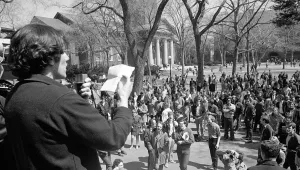On March 22, a fellow soldier gave his life for a little boy on a dirt road in Afghanistan. He rescued him from the path of a 14-ton armored vehicle, sacrificing his own life in the process. There have been many acts of heroism and selflessness during the war in Afghanistan, but this most recent one stands out: not only because the life that was saved is so pure and blameless, but because this act contrasts so sharply with the murder of 17 sleeping children and adults by another fellow soldier earlier in the same month.
How do we reconcile the acts of our two comrades? On one hand, a protector of life and on the other a taker of life. Because of one we feel pride and a brotherhood of purpose. Because of the other we feel shame and revulsion. Yet they are both our comrades. We trained with them, ate with them, laughed with them and cried with them. What does this mean for us? Are we capable of doing what they did?
This week, many of the world’s Christians remember the last days of Jesus of Nazareth. In that story we can find some answers. As it has been for soldiers throughout history, 2,000 years ago it also fell to the Roman soldiers to leave their families to serve in a far-off land and do the will of their fellow citizens back home. They too were trained to fight and were armed with the finest weapons of their day. In the Gospel of Matthew we read that one of these soldiers, a Centurion, upon greeting Jesus, displayed a faith that the Nazarene called greater than any other he had encountered. And it was a Centurion who proclaimed Jesus at his crucifixion “the Son of God.”
Certainly these soldiers set an example that we can aspire to. But those who crucified Jesus were also soldiers. They not only carried out their orders for the crucifixion, but they took advantage of their position to abuse their prisoner; stripping him, spitting on him, and mocking him as they did so. They crucified him in a manner that was barbarous even by the standards of that time.
What did Jesus say about soldiers in his many sermons and teachings? Jesus criticized many groups in his lifetime, but he never once singled out soldiers. He did not blame the soldiers for what they did to him but, neither did he excuse them. Perhaps Jesus empathized with the nature of a soldier’s life: a readiness to lay down one’s life for another, a total submission to a higher authority and the reality that in many of their choices life and death hung in the balance.
As soldiers we must remain vigilant, not only against the enemy from without but against the enemy from within. We must look for the goodness that lives in all people and, when we fail to find it, ask for the wisdom to act properly. We must hold ourselves and our comrades to the highest standards even when all around us we encounter evil.
When a soldier makes the right choices, his deeds can be famous. When he makes the wrong choices, they are infamous. Each of us confronts these choices every day. In war, the choices and the results are magnified. The sins or virtues of a soldier are not easily hidden.
Kevin Ryan, a retired brigadier general, is executive director for research at the Belfer Center for Science and International Affairs at Harvard University’s Kennedy School of Government.



